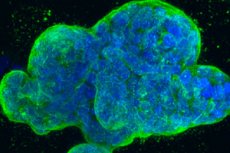Scientists have identified a new marker for breast cancer prognosis
Last reviewed: 14.06.2024

All iLive content is medically reviewed or fact checked to ensure as much factual accuracy as possible.
We have strict sourcing guidelines and only link to reputable media sites, academic research institutions and, whenever possible, medically peer reviewed studies. Note that the numbers in parentheses ([1], [2], etc.) are clickable links to these studies.
If you feel that any of our content is inaccurate, out-of-date, or otherwise questionable, please select it and press Ctrl + Enter.

A protein called RPGRIP1L (retinitis pigmentosa GTPase regulator interacting protein 1-like) performs various functions important for development and health throughout life. Mutations in the RPGRIP1L gene are associated with various diseases.
A new study published in the FASEB Journal indicates that RPGRIP1L gene expression levels may serve as a new prognostic marker for patients with invasive breast cancer.
When studying breast tissue samples from different women, the researchers found that RPGRIP1L expression was increased in invasive breast cancer samples compared to normal breast tissue. Additionally, among patients with invasive breast cancer, those with high expression of the RPGRIP1L gene had shorter survival times compared to patients with low expression. Moreover, increased RPGRIP1L expression was correlated with a number of unfavorable clinicopathological features, such as the presence of more aggressive forms of cancer and larger tumors.
The researchers also identified 50 genes and 15 proteins whose expression was positively correlated with RPGRIP1L expression. Most of these proteins and genes were involved in various aspects of the immune response and metabolism.
Finally, the team found that four compounds used against cancer—abrin, epigallocatechin gallate, gentamicin, and tretinoin—showed potential to reduce RPGRIP1L expression in laboratory experiments.
“The results of our study highlight the potential of RPGRIP1L as a meaningful prognostic biomarker for breast cancer and suggest the viability of new therapeutic strategies that may modify the course of the disease, thereby potentially improving survival rates among affected patients,” said study co-author Ph.D. Jie Zeng is from the First Affiliated Hospital of Hunan Normal University in China.
